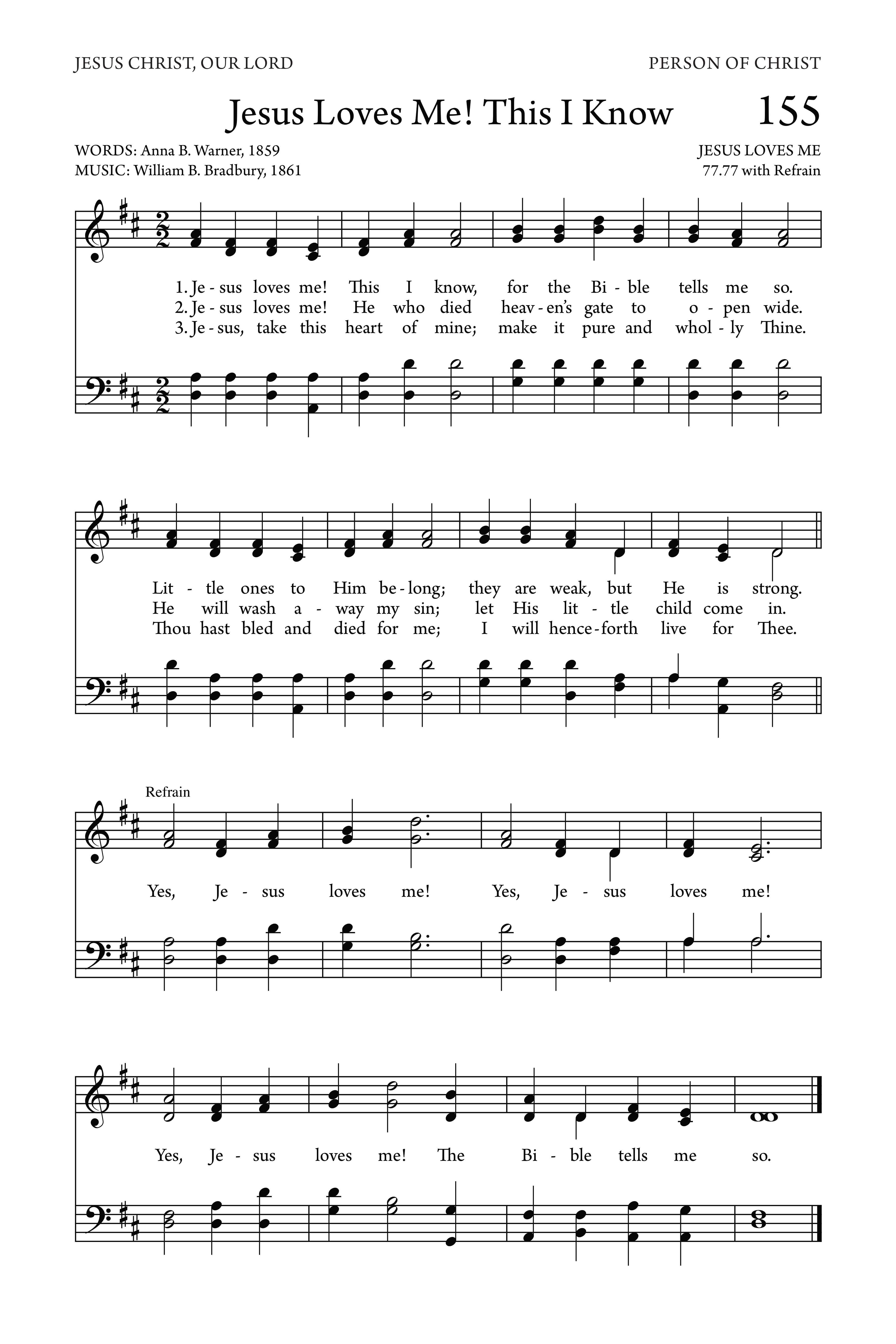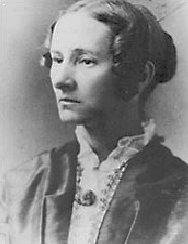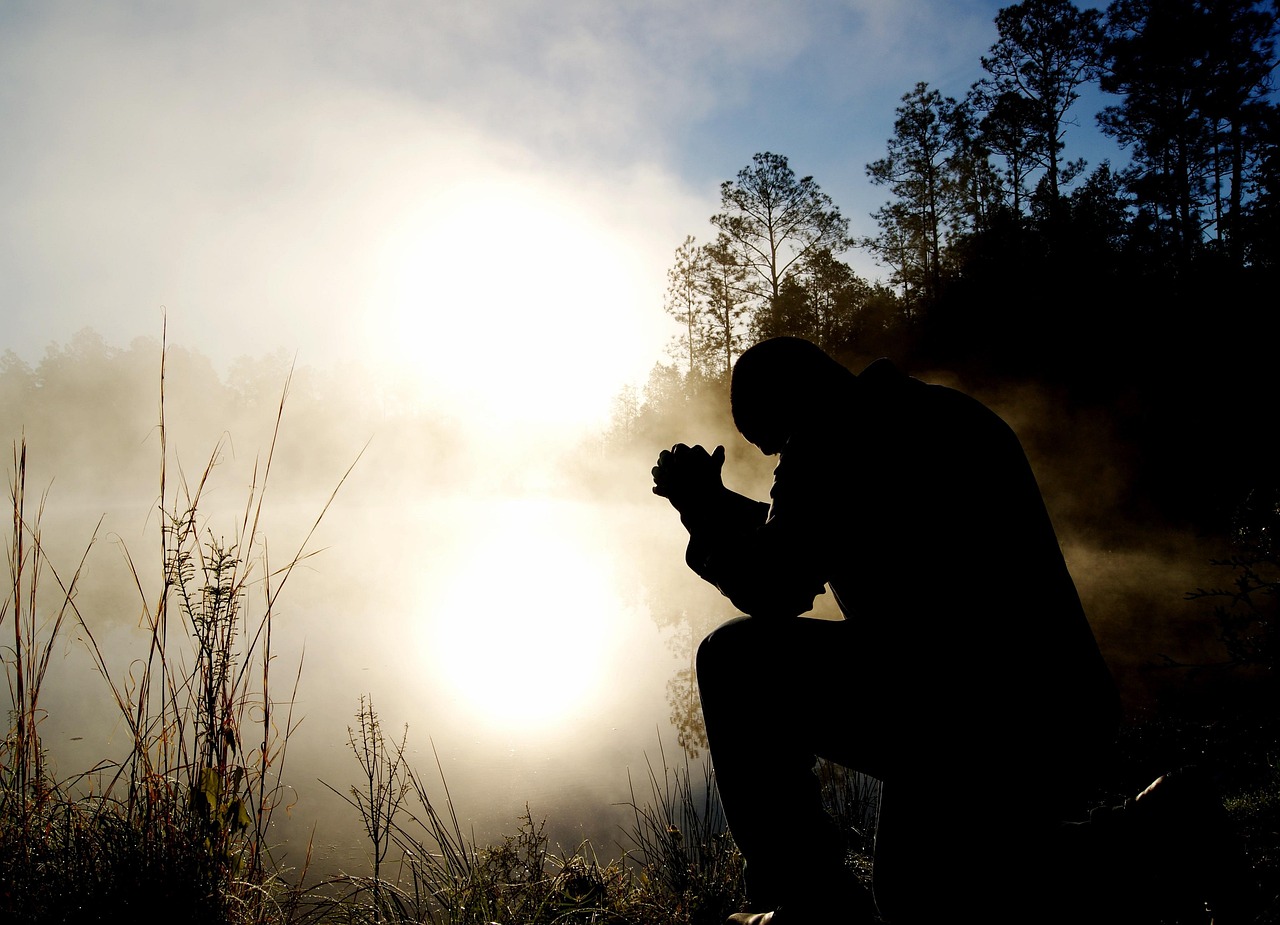Jesus Loves Me This I Know
By Anna Bartlett Warner
Lyrics
for the Bible tells me so.
Little ones to him belong;
they are weak, but he is strong.
Yes, Jesus loves me! Yes, Jesus loves me!
Yes, Jesus loves me! The Bible tells me so.
heaven's gate to open wide.
He will wash away my sin,
let his little child come in.
as he loved so long ago,
taking children on his knee,
saying, "Let them come to me."
Bible Reference
Mark 10:15
About This Hymn
Author – Anna B. Warner (1820–1915)
Composer – William B. Bradbury (1816–1868)
Meter – 11.11 with Chorus
Scripture – “And he took them up in his arms, put his hands upon them, and blessed them.” — Mark 10:16 (KJV)
Few hymns in Christian history have had such a profound and lasting impact on children across the world as “Jesus Loves Me.” Written in 1860 by Anna Bartlett Warner, this beloved hymn began as a simple poem within a novel co-written with her sister, Susan Warner. The book, titled Say and Seal, was immensely popular in its day, although the plot is now largely forgotten. However, the tender scene in which the character Mr. Linden comforts a dying boy, Johnny Fax, by softly reciting Anna’s poem, has endured far beyond the novel’s pages. These words—gentle, affirming, and deeply scriptural—soon transcended literature to become one of the most treasured hymns of the Christian faith.
Anna and Susan Warner were devout Christian women, well-educated and deeply committed to ministry. The sisters lived along the Hudson River in New York, near West Point Military Academy. There, they led Sunday School classes for the cadets and became beloved figures within the military community. Their home, known as Good Crag, was eventually bequeathed to the Academy and declared a national shrine. Both sisters were buried with full military honors, a rare recognition of their spiritual influence upon generations of military officers. Following the death of their father, a prominent New York lawyer, the Warner sisters turned to writing out of financial necessity. Susan gained literary acclaim for works like The Wide, Wide World, once considered the most widely read American novel after Uncle Tom’s Cabin. Anna, though less renowned as a novelist, wrote under the pseudonym “Amy Lothrop” and published two volumes of poetry: Hymns of the Church Militant (1858) and Wayfaring Hymns (1869). It was Anna’s poem “Jesus Loves Me,” however, that brought her the greatest and most lasting legacy.
The reach of “Jesus Loves Me” quickly expanded far beyond American shores. Missionaries began reporting its powerful resonance in foreign cultures, where it was often the first hymn taught to new converts—children and adults alike. Its simplicity and emotional clarity made it accessible across language barriers and cultural differences. Such was its impact that there are accounts of its melody and structure being adopted—even altered—by adherents of other religions. Some missionaries shared the striking image of hearing children in Buddhist temples singing a modified version: “Yes, Buddha loves me...” This unintended adaptation only underscored the hymn’s universal appeal and its capacity to express the deepest longings of the human heart for divine love.
The tune that brought Anna Warner’s words to life was composed by William B. Bradbury in 1861. Born in York, Maine, Bradbury was a key figure in early American hymnody. After moving to Boston, he studied under the influential Lowell Mason, widely regarded as the father of American church and school music. Bradbury served as organist and choir director in several large Baptist congregations and was especially known for his work with children. His musical gifts shone brightly in the annual Musical Festivals he organized, where over a thousand children, all dressed uniformly, would sing his compositions in unison. In the latter part of his career, Bradbury dedicated himself entirely to writing and publishing music. From 1841 until his death in 1868, he oversaw the publication of fifty-nine collections of sacred and secular music. For “Jesus Loves Me,” he not only wrote the tune but also added the now-iconic chorus, “Yes, Jesus loves me…” The hymn appeared in its complete form in The Golden Shower (1862), one of his many influential songbooks.
William B. Bradbury's contributions to Christian hymnody extend well beyond “Jesus Loves Me.” He also composed tunes for other enduring hymns such as “He Leadeth Me,” “Just As I Am,” “Depth of Mercy,” “Even Me,” “Sweet Hour of Prayer,” and “The Solid Rock.” His work with both children’s and adult hymnody helped shape the American gospel tradition during a formative period in its development. In pairing his memorable melody with Anna Warner’s gentle text, Bradbury ensured that the message of Christ’s love for even the smallest and weakest among us would be cherished by generations. Today, “Jesus Loves Me” continues to be sung in churches, homes, and classrooms around the world—proof of the enduring power of a hymn that began with a few comforting words whispered to a fictional child and grew into one of the most loved expressions of faith in the Christian world.


📬 Subscribe to Our Devotional Updates
Receive weekly hymns, devotionals, and website features directly in your inbox.
Hymn Information

- Category: Hymn
- Author/Writer: Anna Bartlett Warner (1859)
- Added: June 26, 2025
- Last Updated: June 26, 2025
- Views: 1507
MIDI File
More Hymns by Anna Bartlett Warner
Recent Blog Posts
-
 How to Develop a Consistent Prayer Schedule
How to Develop a Consistent Prayer Schedule
Dec 11, 2025 -
 How to Forgive Someone Who Deeply Hurt You
How to Forgive Someone Who Deeply Hurt You
Dec 11, 2025 -

-
 Why Christmas Is Celebrated on December 25
Why Christmas Is Celebrated on December 25
Dec 11, 2025 -
 10 Most Renowned Hymn Writers
10 Most Renowned Hymn Writers
Dec 10, 2025
Visit Us on Social Media
Latest from X (Twitter)
Tweets by HymnalLibraryLatest from Facebook
Latest on YouTube
Daily Bible Verse
Disclaimer
The hymns, sheet music, MIDI files, and related content on this website are provided for educational and research purposes only.
- Public Domain: Many of the hymns featured here are in the public domain and may be freely used.
- Copyrighted Works: Some hymns may still be under copyright protection. Where applicable, permission has either been requested from the copyright owner, or the content is shared under the principles of fair use for educational purposes.
⚠️ Important Notice: If you wish to reproduce, distribute, or use any copyrighted hymn beyond personal study or educational use, you must obtain permission directly from the copyright holder. This website does not grant any rights for commercial use yet.
If there is any other question please address it to us in our Contact Page, for further assistance. Thank you for using the site. May God Bless You.